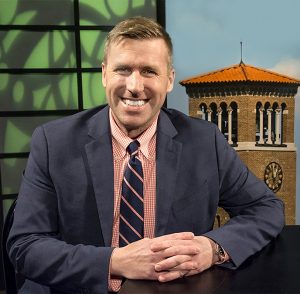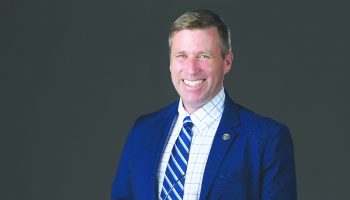
COLUMN BY MICHAEL E. HILL
Welcome to the second week of our 145th Assembly. It has been such a joy to spend our opening week with so many Chautauquans and to welcome all those who are joining us for the first time on the grounds.
Week Two at Chautauqua asks a question that underpins so much of the cultural fabric of the United States today: Who are we as Americans? Who is an American? We’ll spend these coming days exploring these and other questions under the theme “American Identity.”
A recent poll from the Associated Press-NORC Center for Public Affairs Research found that 71 percent of Americans feel the United States is losing its national identity — that is, the beliefs and values the country represents. During this week, we reach across the aisles of both politics and faith. We examine how we’ve de ned American identity throughout our history and the stories we’ve told to shape that identity; the political, economic and social factors that shape our contemporary definitions; and what these different national identities — at times in conflict with one another — mean for our democracy and the prosperity of all Americans. We’ll consider whether a new foundation of American identity is necessary — or even possible.
I couldn’t be more excited that Taína Caragol, curator of painting and sculpture and Latino art and history at the Smithsonian’s National Portrait Gallery, will frame our week through portraiture. Who graces the portraits we count in our national collections? Who should have been captured in these images and was not? And that’s just the beginning of a lineup that includes Jelani Cobb, Chautauqua favorites Jim and Deb Fallows, David Brooks and Amy Chua, whose lecture on Friday drives to the heart of our pursuit of civil dialogue: political tribalism.
Our companion Interfaith Lecture Series explores the role that religion plays in American identity. In the United States, there exists a dynamic tension: we both embrace the separation of Church and State and are counted among the most religious countries in the world. Exploring this tension is a stunning lineup of speakers, along with the week’s chaplain, the Rev. David Gushee, regarded as one of the world’s leading Christian ethicists.
While there are countless artistic moments that will give depth to our week, Chautauqua Theater Company’s production of An Octoroon is a riveting look at the complexities of race in America. As I told the company members when I had the chance to greet them pre-season, artists often evoke emotions and prompt conversations where simple dialogue cannot. I know CTC will do that and more.
Among the things I most admire about Chautauqua are the emotions, reactions and conversations that occur after our iconic 10:45 a.m. lecture series. Each year, the staff and I look across the nine-week platform and take our best guess about which conversations might be the most contentious or difficult to have in community. We are often wrong and/or surprised because, contrary to what some believe, we don’t dictate the remarks of our invited speakers, preachers and artists.
We always hope that our presenters will offer original reflections, and sometimes those reflections go far afield of anything we anticipated. John Irving’s conversation with Pamela Paul certainly was an example of that when Mr. Irving shared his deeply held beliefs of the American political landscape. Several of you shared with me that you appreciated his comments; others found them offensive and unnecessary. Many others questioned the question that led to the remarks in the first place. This sparked many conversations inside the Colonnade and throughout the grounds about the definition of “civil” in the context of “civil dialogue.”
I’ve been thinking about those reactions a lot this week. I wanted to share an email response to a Chautauquan I hold in high regard who questioned Irving’s remarks, Paul’s question, and my responsibilities as that morning’s moderator. In endeavoring to more succinctly define civil dialogue, I shared the following:
“One of the conversations that Monday reignites for me is how to define and engage in civil dialogue at Chautauqua. Civil dialogue does not mean that you will not hear viewpoints you don’t like. While I did not know Mr. Irving was going to take his reflections where he did, if I do my job right, there will be a counterpoint to Mr. Irving multiple times this season. Civil dialogue comes in how we debate, contrast and discuss in community the things we hear that we wholeheartedly disagree with and enthusiastically endorse.
In his new book, The Soul of America, Jon Meacham writes, ‘The measure of our political and cultural health cannot be whether we agree on all things at all times. We don’t, and we won’t. Disagreement and debate – including ferocious disagreement and exhausting debate – are hallmarks of (the) American (experience).’ Central to the experience at Chautauqua is our ability to engage in dialogue those with whom we do not agree. Many ferociously disagreed with Mr. Irving; many also shared his viewpoint. I hope that Mr. Irving’s perspectives afforded a chance for deep debate across Chautauqua this past week. I know it did in my own house.”
The pursuit of civil dialogue is not an easy endeavor. Much of America is organized physically and psychologically into echo chambers of like-minded individuals who believe their answer to the question “What does it mean to be an American?” is the only correct answer. But that’s not Chautauqua.
This is a perfect week for us to live into Meacham’s definition of the American experience. When we measure our own political and cultural health at week’s end, I hope that what you see, hear and feel this week causes lively debate on your porches, on Bestor Plaza, on the water and at the dinner table. If that happens, Chautauqua’s mission will truly come alive.
Thank you for spending time with us at Chautauqua. You are the animating force for all we do.


